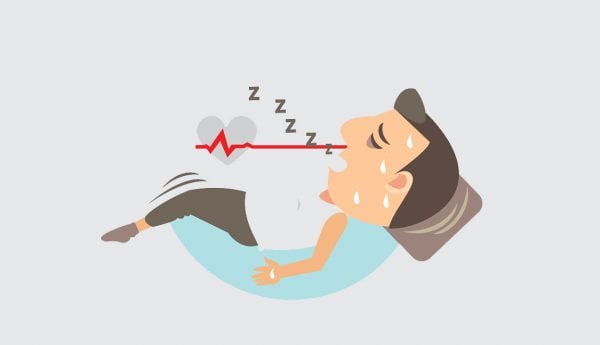Health, Sleep Disorders
Health Risks of untreated Sleep Apnea
The sleep apnea does much more than just disrupt your sleep and your bed partner from loud snore. Sleep apnea which commonly occurs in those who snore loudly is defined by recurrent pauses in breathing during their sleep where the minimum pause time is more than 10 seconds. This may be caused either by obstruction of the airway(obstructive sleep apnea – OSA) or by the brain forgetting to prompt a breath(central sleep apnea – CSA). When this happens, oxygen levels fall, carbon dioxide levels rise, and there is a spike in blood pressure, heart rate, and hormones like cortisol as the body reawakens to breathe. Sleep apnea has been linked to many chronic medical conditions, and even sudden death.
Hypertension
It is estimated that 50-70% of people with sleep apnea have hypertension, or high blood pressure. This increases the risk of heart attack, stroke, and other health problems. Laboratory experiments in animals have shown a cause-and-effect relationship, with the presence of sleep apnea leading to a later development of hypertension. In people with hard-to-control hypertension, it may be that sleep apnea is contributing. It is shocking that 96% of men requiring three blood pressure medications have sleep apnea contributing to the problem! Effective treatment with continuous positive airway pressure (CPAP) can help to improve blood pressure as much as a blood pressure medication.Coronary Artery Disease and Heart Attack
The risk for cardiovascular disease increases due to several mechanisms. Sleep apnea can lead to activation of the sympathetic nervous system. This is responsible for the “fight-or-flight” response. Imagine the stress on your body that occurs when a lion is chasing you, this is the sympathetic nervous system at work.Apnea events may lead to bursts of cortisol, the stress hormone, repeatedly during sleep. In addition, sleep apnea leads to problems with the lining of blood vessels, inflammation, and problems with metabolic regulation and diabetes. All of these can cause problems with blood vessels and this coronary artery disease may lead to major problems like a heart attack.
Stroke
Research shown that the association between stroke and sleep apnea is perhaps as strong as the association between smoking and stroke. There may be several factors involved. During sleep apnea, blood vessels within the brain dilate when the oxygen levels fall. Moreover, individuals with sleep apnea have higher levels of blood factors that make them more susceptible to clots that may lead to stroke. About half of people with atrial fibrillation, a major risk factor for stroke, have sleep apnea contributing to these episodes. Approximately 40-60% of people with stroke are found to have obstructive sleep apnea.Congestive Heart Failure
When apneic events occur, as the affect of stopped breathing will decreased levels of oxygen which can cause blood vessels in the lungs to constrict. This increases the blood pressure in these vessels, and over time may lead to chronic right-sided heart failure.High blood pressure is a major contributor to left-sided heart failure. Some studies have shown that as many as 37% of people with heart failure may have sleep apnea. Untreated sleep apnea may increase the likelihood of heart problems or more worse to death over years.



